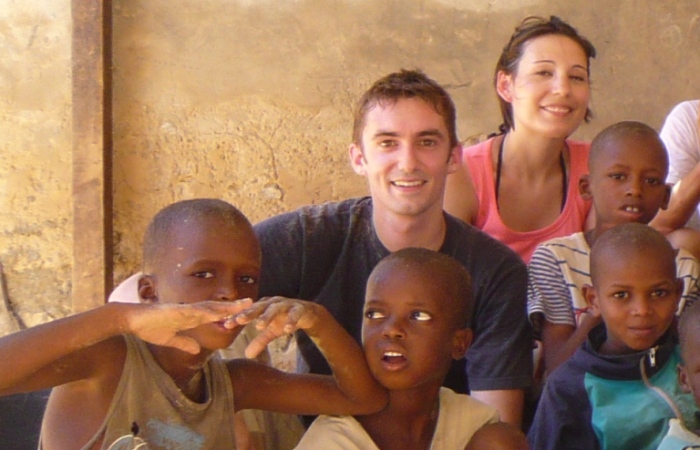JENNY AND JÉRÔME'S EXPERIENCE

We registered as volunteers in Maison de la Gare’s education program. Our first impression on entering
MDG’s centre in Saint Louis was that it is a refuge, full of color and greenery, located in the heart of
the city but away from its trials. Passing through its doors, the talibé become kids again. They feel
safe enough there to dare to set aside their begging bowls for a few hours and let go to play and laugh,
before having to rejoin the hard life of the daaras.
In fact, we quickly realized that Maison de la Gare is more than a refuge, aspiring also to be a place of
education. How to bring some education to children whose lives are so different from ours? We tried to
find the answer to this question during our stay and, for us, this answer takes many forms and remains open.
We started with the most obvious form of education: what we provide in class. Like other volunteers before
us, we taught the children mathematics and French. However, we learned that the most difficult and most
important task is not teaching the material, but it is to give the children the desire to come back to
class the next day, to be diligent and, for the older talibés, to understand the link between coming to
class and their future lives as adults.
Respect for their environment and others seemed to us to be an essential starting point. For this, we
tried to establish several rules such as picking up litter on the ground, not fighting, and respecting
the schedules which we posted around the center. Our aim was to provide benchmarks and teach them some
rules of life in society. However, it was difficult to impose constraints as these were often misunderstood
initially by children whose religious education and life are already so difficult, compounded by the language
barrier.
Very quickly, we realized it was also important to take time to teach the children the basics: washing
themselves. This may seem obvious, but we came to understand that washing and knowing why we wash are
not innate in children, much less so when these children live on the streets left to themselves without
educational models. We organized showering for them, especially younger ones, and taught them how to use
soap and to lather the body properly.
Through our little time in the daaras where the children live, we discovered their living conditions beyond
Maison de la Gare and the streets of the city. This time in the daaras was difficult for us to handle
emotionally. This is where the magnitude of the task the Maison de la Gare is trying to accomplish really
hits you. The support that we were able to provide as volunteers for a short period seems very meagre in
face of how much work needs to be done. We were left with two mixed feelings: refusing to be discouraged,
and regretting that we couldn't do more.
Finally, we have had a glimpse of Senegalese Africa, its culture and its people that we have discovered for
the first time. We met children, men and women, appreciated and enjoyed many of them and especially admired
one of them, Issa, the president of Maison de la Gare who devotes himself body and soul to the talibé street
children, with courage and humility. However, a single man no matter how strong or willing cannot bear alone
the burden imposed on these Senegalese children.
We are happy to have been able to contribute in this struggle but so much remains to be done, and we end with
a loud plea for anyone who would be willing to come and give their support in turn...
(Please click here to
see Jenny and Jérôme's full article with their photos)






